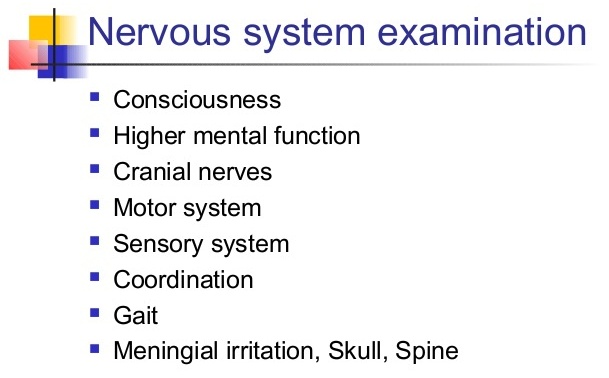What is a neurological exam?
A neurological exam checks for disorders of the central nervous system. The central nervous system is made of your brain, spinal cord, and nerves from these areas. It controls and coordinates everything you do, including muscle movement, organ function, and even complex thinking and planning.There are more than 600 types of central nervous system disorders. The most common disorders include:
A neurological exam is made up of a series of tests. The tests examine your balance, muscle strength, and other functions of the central nervous system.
Other names: neuro exam.
What is it used for?
A neurological exam is used to help find out if you have a disorder of the nervous system. Early diagnosis can help you get the right treatment and may decrease long-term complications.Why do I need a neurological exam?
You may need a neurological exam if you have symptoms of a nervous system disorder. Symptoms vary depending on the disorder, but common symptoms include:What happens during a neurological exam?
A neurological exam is usually performed by a neurologist. A neurologist is a doctor who specializes in diagnosing and treating disorders of the brain and spinal cord. During the exam, your neurologist will test different functions of the nervous system. Most neurological exams include tests of the following:- Mental status. Your neurologist or other provider will ask you general questions, such as the date, place, and time. You may also be asked to perform tasks. These may include remembering a list of items, naming objects, and drawing specific shapes.
- Coordination and balance. Your neurologist may ask you to walk in a straight line, placing one foot directly in front of the other. Other tests may include closing your eyes and touching your nose with your index finger.
- Reflexes. A reflex is an automatic response to stimulation. Reflexes are tested by tapping different areas of the body with a small rubber hammer. If reflexes are normal, your body will move a certain way when tapped with the hammer. During a neurological exam, the neurologist may tap several areas on your body, including below your kneecap and areas around your elbow and ankle.
- Sensation. Your neurologist will touch your legs, arms, and/or other body parts with different instruments. These may include a tuning fork, dull needle, and/or alcohol swabs. You will be asked to identify sensations such as heat, cold, and pain.
- Cranial nerves. These are the nerves that connect your brain with your eyes, ears, nose, face, tongue, neck, throat, upper shoulders, and some organs. You have 12 pairs of these nerves. Your neurologist will test specific nerves depending on your symptoms. Testing may include identifying certain smells, sticking out your tongue and trying to speak, and moving your head from side to side. You may also get hearing and vision tests.
- Autonomic nervous system. This is the system that controls basic functions such as breathing, heart rate, blood pressure, and body temperature. To test this system, your neurologist or other provider may check your blood pressure, pulse, and heart rate while you are sitting, standing, and/or lying down. Other tests may include checking your pupils in response to light and a test of your ability to sweat normally.
Will I need to do anything to prepare for a neurological exam?
You don't need any special preparations for a neurological exam.Are there any risks to the exam?
There is no risk to having a neurological exam.What do the results mean?
If results on any part of the exam were not normal, your neurologist will probably order more tests to help make a diagnosis. These tests may include one or more of the following:- Blood and/or urine tests
- Imaging tests such as an x-ray or MRI
- A cerebrospinal fluid (CSF) test. CSF is clear fluid that surrounds and cushions your brain and spinal cord. A CSF test takes a small sample of this fluid.
- Biopsy. This is a procedure that removes a small piece of tissue for further testing.
- Tests, such as electroencephalography (EEG) and electromyography (EMG), which use small electric sensors to measure brain activity and nerve function
Is there anything else I need to know about a neurological exam?
Nervous system disorders and mental health problems can have similar or the same symptoms. That's because some behavioral symptoms can be signs of a nervous system disorder. If you had a mental health screening that was not normal, or if you notice changes in your behavior, your provider may recommend a neurological exam.This health news has been brought to you by the publishers of Health Reviews, Tips and News Website. Visit today for great health tips and reviews.




No comments
Post a Comment